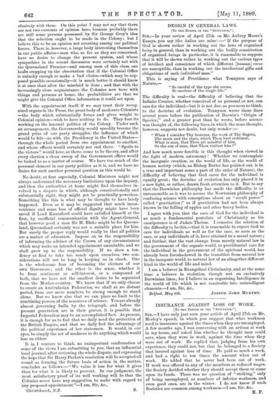DESIGN IN GENERAL LAWS. [To THE EDITOR OF THE "
SPECTATOR:1
Sin,—In your review of April 27th on Mr. Aubrey Moore's Essays, you say (the italics are mine) :—" If the purpose of God is shown rather in working out the laws of organise&
being in general, than in working out the bodily constitution of organised beings in particular, it is reasonable to suppose that it will be shown rather in working out the various types of intellect and conscience of which different [human] races are susceptible, than in working out the intellectual gifts and obligations of each individual man."
This is saying of Providence what Tennyson says of Nature—
"So careful of the type she seems, So careless of the single life."
The difficulty is real—the difficulty of believing that the Tnfinite Creator, whether conceived of as personal or not, can care for the individual—but it is not due, as you seem to think,
to the doctrine of evolution. Tennyson wrote those lines several years before the publication of Darwin's "Origin of Species ;" and a greater poet than he wrote, before science was thought of, the following lines, in which the same thought, however, suggests not doubt, but only wonder :—
"When I consider Thy heavens, the work of Thy fingers, The moon and the stars, which Thou hast ordained; What is man, that Thou art mindful of him, Or the son of man, that Thou visitest him ?"
And how much more forcible is this thought when viewed in the light of modern astronomy ! Whether we contemplate.
the inorganic creation, or the world of life, or the world of human society (which, as Bishop Butler has pointed out, is ii.
a true and important sense a part of the order of Nature), the difficulty of believing that God cares for the individual is equally great ; the doctrine of evolution has only placed it in a new light, or rather, drawn fresh attention to it. But to say that the Darwinian philosophy has made the difficulty, is as unreasonable as it was to accuse the Newtonian philosophy of confusing science with conceptions about an "occult power" called "gravitation ;" as if gravitation had not been always known in the falling of apples and other heavy bodies.
I agree with you, that the care of God for the individual is as much a fundamental postulate of Christianity as his omnipotence is of Judaic Theism. I conceive the solution of the difficulty to be this,—that it is reasonable to expect God to care for individuals as well as for the race, so soon as the race, or any individuals of it, have attained to a moral nature ; and further, that the vast change from merely natural law in the government of the organic world, to providential care for the individual in the government of the spiritual world, has already been foreshadowed in the transition from natural law in the inorganic world, to natural law of an altogether different kind in the world of life and mind.
I am a believer in Evangelical Christianity, and at the same time a believer in evolution, though not on exclusively Darwinian lines; for I believe in an organising Intelligence in






































 Previous page
Previous page